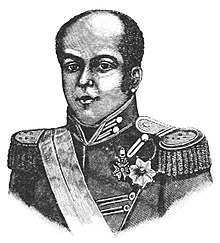Faustin Soulouque

Faustin Soulouque (* 1782 in the Petit-Goâve district , Haiti ; † August 4, 1867 ibid) was a Haitian politician and from 1847 to 1849 president and from 1849 to 1859 as Faustin I, the only emperor of the Second Empire of Haiti.
Life
Faustin Soulouque was born a slave in Haiti in 1782. When slavery was abolished eleven years later in 1793 , he was given his freedom.
At the age of 22 he got a job with General Jean-Jacques Dessalines , the first emperor of Haiti, in 1804 , and later he became his adjutant. In 1810, Soulouque served as a lieutenant under President Alexandre Sabès Pétion . When his employer died, Soulouque switched to his successor Jean-Pierre Boyer on the same day .
Under his command, Soulouque soon became captain. In 1843 he was promoted to colonel and a short time later to general. As a result, Boyer entrusted him with the leadership of the presidential guard.
In 1846 Soulouque took over the command of Port-au-Prince and was elected President of the Republic by the Senate on March 1, 1847 after the death of Jean-Baptiste Riché . Since he could neither read nor write, Solouque, politically a completely blank slate, was considered completely uneducated and simple-minded. He therefore seemed to be an ideal exponent for the so-called politique de doublure ("proxy politics "), which was understood to mean the election of black presidents who were controlled by the mulattos . At first, Soulouque seemed to want to do this job faithfully and was guided by his Mulatto advisors.
“ In view of his long reign, however, one must assume that he, completely underestimated by his contemporaries, quickly developed an awareness of the problems and power relations in his country. “( Walther L. Bernecker ) Soulouque soon no longer thought of continuing to play the role of the marionette intended for him. On April 16, 1848, Soulouque's subliminal power struggle against his mulatto masters in Port-au-Prince escalated into a four-day bloodbath of the Mulatto elite, who at that time were possibly already working on his removal.
For fear of further atrocities, the Chamber of Representatives publicly thanked dictator Soulouque on December 3, 1848 for saving the fatherland and the constitution. A campaign against the rebellious mulattos of Santo Domingo (which had become independent in 1844) in March 1849 ended shamefully for Soulouque. Nevertheless, Faustin Soulouque was proclaimed emperor on August 26 of the same year. On April 18, 1852, Soulouque was crowned as Faustin I in the capital in a pompous manner. His enthronement devoured the entire state treasury; The diamond-studded crown alone , which Faustin had placed on his head, cost $ 100,000. Faustin I set up his court on the model of France and Napoleon III. out. After his accession to the throne, Faustin I donated the two orders of Saint Faustin for military personnel and the Legion of Honor for civilians. Soulouque created his own aristocracy: “ Four princes, 59 dukes and a myriad of counts, barons and other ennobled heads formed the 'island nobility', which was often mocked in the French press. "
Soulouque was the first head of government since independence to give voodoo an equal position alongside official Catholicism , although both were closely intertwined in the religious practices of the common people . For this reason the Vatican resolutely rejected a Concordat with Haiti. When an apparition of the Virgin Mary was reported in Sodo , Soulouque had a pilgrimage chapel built there.
His three attempts to subjugate Santo Domingo failed, as did those of his predecessors. Faustin I ruled absolutist and exploited the country. On December 22, 1858, when Haiti was proclaimed a republic, a civil war began . General Fabre Geffrard began his march against Faustin I from Gonaïves . As the dictator had little support from the population, he was betrayed and arrested on January 15, 1859 in the capital Port-au-Prince.
Known for his generosity, General Geffrard let Faustin I emigrate to Jamaica . After the fall of Geffrard in 1867, he received permission to return home and died there at the age of 85 on August 4, 1867 in Petit-Goâve .
Footnotes
- ↑ a b c Walther L. Bernecker , Kleine Geschichte Haitis, Frankfurt am Main 1996, p. 84
- ↑ Hans Christoph Buch, Die Welt, March 15, 2007, p. 3
- ↑ Walther L. Bernecker, Kleine Geschichte Haitis, Frankfurt am Main 1996, p. 86, see also http://www.haiti-usa.org/special_features/daumier_cham/index.php
- ↑ a b Walther L. Bernecker, Kleine Geschichte Haitis, Frankfurt am Main 1996, p. 87
Web links
- Literature by and about Faustin Soulouque in the catalog of the German National Library
- retrobibliothek.de: Meyer's Konversationslexikon about Faustin Soulouque
| predecessor | Office | successor |
|---|---|---|
| Jean-Baptiste Riché |
President of Haiti March 1, 1847 - January 15, 1859 |
Fabre Geffrard |
| personal data | |
|---|---|
| SURNAME | Soulouque, Faustin |
| ALTERNATIVE NAMES | Faustin I. Emperor of Haiti |
| BRIEF DESCRIPTION | Emperor of Haiti |
| DATE OF BIRTH | 1782 |
| PLACE OF BIRTH | Petit Goyave District , Haiti |
| DATE OF DEATH | 4th August 1867 |
| Place of death | Petit Goyave District , Haiti |
